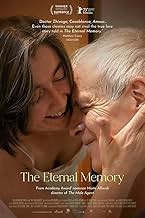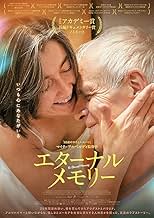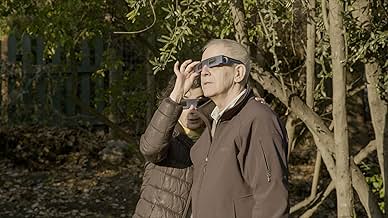ÉVALUATION IMDb
7,4/10
3,9 k
MA NOTE
Ajouter une intrigue dans votre langueAugusto and Paulina have been together for 25 years. Eight years ago, he was diagnosed with Alzheimer's disease. Both fear the day he no longer recognizes her.Augusto and Paulina have been together for 25 years. Eight years ago, he was diagnosed with Alzheimer's disease. Both fear the day he no longer recognizes her.Augusto and Paulina have been together for 25 years. Eight years ago, he was diagnosed with Alzheimer's disease. Both fear the day he no longer recognizes her.
- Nommé pour 1 oscar
- 14 victoires et 27 nominations au total
Gustavo Cerati
- Self
- (archive footage)
Pedro Lemebel
- Self
- (archive footage)
Javier Bardem
- Self
- (archive footage)
- (uncredited)
Avis en vedette
Filmed during the COVID lockdown, this really is a poignant and affecting love story. We are introduced to Augusto Gongora and his wife Paulina Urrutia. The former was an accomplished television journalist in Chile during it's frequently turbulent times, she an acclaimed actress and they have, by 2023, been married for a quarter of a century. What we discover quickly is that he is suffering from Alzheimer's and as the pair continue through the life, both dread what they know to be coming: the day when he will no longer know who she is. This is one of those rare documentaries where the actuality of the political trouble and strife actually serve to deliver us a bit of a breather from the intensity of this most human of stories as the couple wake up each morning without any idea what that day may bring. The lockdown scenario and the hand-held photography ensures that there are few other characters to divert our focus from this intimate and heart-rending depiction of their determination not to allow this disease to prevail any earlier than they have to. Their habits and routines are designed to elicit as many memories and triggers as possible to enable Augusto to hold onto his soul for just that bit longer, but he isn't a King Canute and even throughout the timeframe of this documentary we see that they cannot thwart the inevitable. It's not some melancholy affair, though. Their grandchildren enliven things and this couple are still very much up for the joys of life. There is plenty of laughter to remind us that it's life they want to live, not just an existence they wish to seek. From an observer's perspective we also get a little of the sense of the frustration felt by this man who, as a journalist, was a voracious reader but who can no longer enjoy his vast library. We also see a dedication and affection from Paulina who must also recalibrate from time to time to ensure that she doesn't succumb to the relentless pressures of living such an unpredictable life. This isn't an easy watch, but over ninety minutes we get an insight into just how spirit and a sense of humour can still make a difference.
Greetings again from the darkness. Augusto and Paulina are a real couple facing real challenges in the real world. Their challenges aren't related to where to head for dinner or whether Augusto will leave the toilet seat up or down. No, their daily challenges are whether Augusto will wake up and recognize his wife, or even know his own name. Chilean Documentarian Maite Alberti climbs inside this relationship to show us the real impact of Alzheimer's Disease, and does so expertly and intimately.
Augusto Gongora was a professional News Reporter/Journalist during the Pinochet regime, and Paulina Urrutia was a successful actor ... both well known in their country. We even see clips and archival newsreels of Augusto's work. However, filmed during COVID, almost the entirety of the film is focused on these two people taking each day as it comes ... the good days and the not-so-good days. And perhaps 'moments' is a better measure than days, as this cruel disease can shift quickly. Paulina handled much of the camera work so the director and crew could keep safe distance during the pandemic, and the result is a few blurry shots, none of which detract from what we are meant to see.
Paulina helps Augusto with his memory of work and kids. She helps him take a shower. She reads to him when they take walks, and she cringes as he rides a bicycle. She helps him with his eye protection as they view the eclipse. They even treasure the time they can dance together. There are many times they share a laugh, and there are times Paulina cries alone or Augusto appears lost. Mostly they have their tender moments which define the relationship that they so want to hold on to ... all while surrounded by Augusto's lifelong collection of books that fill the house - most of which he can no longer read.
Theirs is a love story. And it's real.
Augusto Gongora was a professional News Reporter/Journalist during the Pinochet regime, and Paulina Urrutia was a successful actor ... both well known in their country. We even see clips and archival newsreels of Augusto's work. However, filmed during COVID, almost the entirety of the film is focused on these two people taking each day as it comes ... the good days and the not-so-good days. And perhaps 'moments' is a better measure than days, as this cruel disease can shift quickly. Paulina handled much of the camera work so the director and crew could keep safe distance during the pandemic, and the result is a few blurry shots, none of which detract from what we are meant to see.
Paulina helps Augusto with his memory of work and kids. She helps him take a shower. She reads to him when they take walks, and she cringes as he rides a bicycle. She helps him with his eye protection as they view the eclipse. They even treasure the time they can dance together. There are many times they share a laugh, and there are times Paulina cries alone or Augusto appears lost. Mostly they have their tender moments which define the relationship that they so want to hold on to ... all while surrounded by Augusto's lifelong collection of books that fill the house - most of which he can no longer read.
Theirs is a love story. And it's real.
"The Eternal Memory" is a portrait of love, memory and identity as chronicled through the penultimate days of renowned Chilean journalist Augusto Gongora by his wife, the actress and politician Paulina Urrutia. It's a profound look at love and companionship and is also an enlightening study of the concepts of memory and identity... Whether that be of Gongora himself, who due to his Alzheimer's is losing his memory, or the work he dedicated his life to, that being the preservation of the collective Chilean memory and identity. It's a sad but tender documentary that is universal in its message and inclusive in its identity. It's a part of us, a part of humanity and a part of the future. Do check this out!
It's been said that one of the most cherished hopes for a loving relationship is that its partners inevitably have someone with whom they can grow old together, a time when they can warmly look back on their time as a couple with fondness and treasured memories. But what happens when something occurs that threatens to steal those precious recollections? That's one of the tragedies that can come with various forms of dementia, such as Alzheimer's Disease, a condition that seriously endangered the long-term loving partnership of renowned Chilean author/journalist Augusto Góngora and his wife, actress and former Minister of Culture Paulina Urrutia. But, rather than seeking seclusion in the wake of that diagnosis, Góngora insisted on making his story public, telling the tale of his condition and the diligent, compassionate efforts of Urrutia in acting as his caregiver, particularly in helping him hold on to his memory as fully and as long as possible. Their story is sensitively recounted in writer-director Maite Alberdi's moving documentary, a film that will simultaneously warm and break your heart. In telling their tale, this title explores the importance of preserving one's memories as a measure of one's identity and accomplishments, both personally and professionally. In Góngora's case, that involves the depth of his love for his wife, family and friends, as well as the critical role he played in making the Chilean public aware of the grotesque atrocities that unfolded in the wake of the country's 1973 coup d'etat and the restoration of the nation's cultural and artistic heritage after its return to democracy with the ouster of the Pinochet regime in 1990. Those recollections, in his view, represent a depth of courage that's to be preserved and not lost to the ravages of time and illness. This Oscar nominee for best documentary feature and its designation as one of 2023's top documentaries by the National Board of Review is a striking piece of filmmaking, one that's sure to touch virtually anyone who watches it (but be sure to keep those hankies handy). When we consider what can potentially be lost under circumstances like these, any efforts made to prevent that are truly heroic steps to be commended, and this film does an outstanding job at making that known, both in this case and as a practice to be employed whenever comparable conditions arise.
The movie "The Eternal Memory" is a Chilean documentary that delves into the resilience of love in the face of memory loss. Director Maite Alberdi, known for her other documentary "The Mole Agent," takes us back in time to explore the lives of Augusto Gongora and Paulina Urritia, a couple recognized for their famous careers in Chile-he as journalist and writer, and she as an actress. Using archival footage, the director highlights Augusto's political activism during Pinochet's dictatorship, alongside his relationship with his wife Paulina. They both confront the fear that his deteriorating memory might one day erase their love. Paulina's persistent struggle to keep her presence alive in Augusto's memory is both deeply touching and sad.
This documentary is a sensitive and poignant documentary that discusses the suffering that everyone feels when the memory of a loved one begins to fade, exactly like smoke that gradually evaporates.
The final half hour of the movie appears to be abruptly edited, leaving us with a detailed understanding of the couple's life together but lacking insight into the progression of Alzheimer's and its impact on both.
This documentary is a sensitive and poignant documentary that discusses the suffering that everyone feels when the memory of a loved one begins to fade, exactly like smoke that gradually evaporates.
The final half hour of the movie appears to be abruptly edited, leaving us with a detailed understanding of the couple's life together but lacking insight into the progression of Alzheimer's and its impact on both.
Le saviez-vous
- AnecdotesAugusto Góngora, used to be the host in the Chilean broadcasts of the Academy Awards. Now, the story of his struggle with Alzheimer's is nominated for the Academy award for best documentary feature.
- Citations
Augusto Góngora: I want to see my friends and something strange is happening here.
- ConnexionsFeatured in The Oscars (2024)
- Bandes originalesA Dónde Van
Written, composed and performed by Silvio Rodríguez
Meilleurs choix
Connectez-vous pour évaluer et surveiller les recommandations personnalisées
- How long is The Eternal Memory?Propulsé par Alexa
Détails
Box-office
- Brut – États-Unis et Canada
- 67 594 $ US
- Brut – à l'échelle mondiale
- 118 866 $ US
- Durée1 heure 25 minutes
- Couleur
- Mixage
- Rapport de forme
- 1.85 : 1
Contribuer à cette page
Suggérer une modification ou ajouter du contenu manquant

Lacune principale
What is the Canadian French language plot outline for La memoria infinita (2023)?
Répondre
![Regarder Trailer[OV]](https://m.media-amazon.com/images/M/MV5BYzMzYTU5NTItNDYxZC00NzUzLWJjMTktZDg4YjkwNzY5ZmEwXkEyXkFqcGdeQXRyYW5zY29kZS13b3JrZmxvdw@@._V1_QL75_UX500_CR0)
























